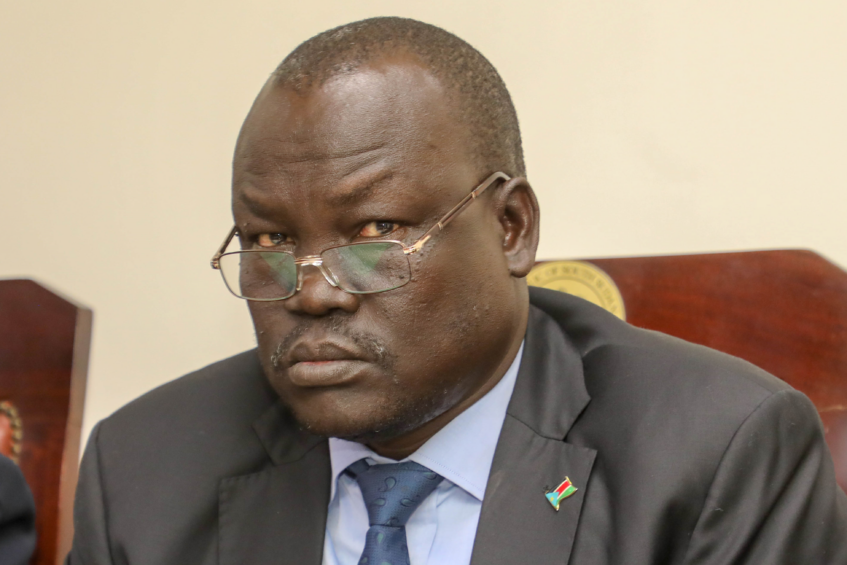You are here: Home | Humanitarian | News | Govt, partners seek $358 million for humanitarian response

Hon. Albino Atak, the Ministry of Humanitarian Affairs - Credit: Moses Awan/Eye Radio - April 26, 2023
South Sudan government and partners need up to 358 million US dollars to respond to the dire humanitarian crisis in the country through the last quarter of this year, according to an official.
Albino Atak, the Minister of Humanitarian Affairs and Disaster Management said the situation is deteriorating at the Sudan border, where hundreds of thousands have crossed to South Sudan since April 15, when a bitter urban battle erupted in Khartoum.
Atak said about 131,000 people have so far returned to Upper Nile, 50,000 to Unity State, and 45,000 to Central Equatoria.
Meanwhile, Northern Bahr el Ghazal received about 20,000 returnees, Jonglei 12,000, Western Bahr el Ghazal, 10,000, Warrap 8,000, and Abyei 4,000.
The official said the country is facing insufficient resources to respond to the increasing needs of those fleeing the Sudan conflict.
He said with the increasing influx of returnees, humanitarian needs have tripled.
“Together with our partners, in the first three months, the money that we wanted was 96 million US dollars for all, the government and partners for them to respond to the crisis,” Atak told the press in Juba Thursday.
“Now, when we reviewed the plan the same way, now what we need from here to the end of the year for us to sufficiently intervene is 358 million. This is what is needed so the challenge that we are facing is insufficient of the resources.”
UN OCHA reported that as of 29 September, about 291,224 individuals were recorded at the border crossings into South Sudan since the fighting in Sudan erupted on 15 April 2023.
It adds that the influx of new arrivals which comprise returnees, refugees and asylum-seekers is projected to continue.
Joda-Renk border continues to be the main point of entry, according to the agency.
It said 30,000 of the arrivals are refugees and asylum-seekers, with the majority going to Aweil, Maban and Juba.
– Looming hunger –
On October 3, UN’s food agency warned that a hunger emergency is looming on the border between South Sudan and Sudan as families continue to cross the border every day.
World Food Program (WFP) said the displaced are overwhelmingly South Sudanese, among whom, one in five children are malnourished and 90 percent of families say they are going multiple days without eating.
It cited a new food security assessment indicating that 90 percent of returnee families are experiencing moderate or severe food insecurity, while almost 20 percent of children under five and more than a quarter of pregnant and breastfeeding women are malnourished.
“We are seeing families leave one disaster for another as they flee danger in Sudan only to find despair in South Sudan,” says Mary-Ellen McGroarty, WFP’s Country Director in South Sudan.
“The humanitarian situation for returnees is unacceptable and WFP is struggling to meet the mounting humanitarian needs at the border. We simply do not have the resources to provide life-saving assistance to those who need it most.”
WFP said the rainy season has made conditions at crowded transit centres and border crossings even more difficult, with flooding worsening food insecurity and contributing to the spread of disease.
– WFP appeals for $120m –
The UN food agency said it is in the frontline – providing food and non-food assistance “to meet the immediate needs of the families at the border.
However, WFP said it urgently requires more than 120 million U.S. dollars to increase support for people fleeing Sudan’s war into South Sudan over the next few months.
“Significant resources are also needed to help people move onwards from the crowded border area and to support them as they rebuild their lives in South Sudan, a country many of the returnees have never actually lived in,” read the statement.
WFP further said it has a funding gap of US$536 million over the next six months and was only able to reach 40 per cent of food insecure people with food assistance in 2023.
Those who are receiving assistance only receive half rations due to funding shortfalls which is further entrenching food insecurity, it added.
Support Eye Radio, the first independent radio broadcaster of news, information & entertainment in South Sudan.
Make a monthly or a one off contribution.
Copyright 2024. All rights reserved. Eye Radio is a product of Eye Media Limited.